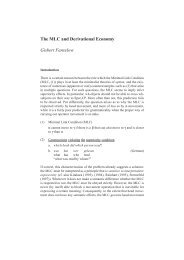Differential subject marking in Polish: The case of Genitive vs ...
Differential subject marking in Polish: The case of Genitive vs ...
Differential subject marking in Polish: The case of Genitive vs ...
You also want an ePaper? Increase the reach of your titles
YUMPU automatically turns print PDFs into web optimized ePapers that Google loves.
BE is unusual <strong>in</strong> yet another respect: unlike most other verbs, BE <strong>in</strong> <strong>Polish</strong> (also <strong>in</strong> Russian) has a<br />
separate iterative/habitual paradigm; see Table 2. 28, 29<br />
Table 2: Aspectual forms <strong>of</strong> BE<br />
ASPECT<br />
ITERATIVE bywac IMPERF?/PERF? byc<br />
FUTURE bedzie bywac 30 bedzie<br />
PRESENT bywa jest<br />
PAST bywal/-a/-o byl/-a/-o<br />
Judg<strong>in</strong>g from the diagnostics mentioned above, the iterative bywac is clearly imperfective. Like<br />
imperfective verbs, (i) it can appear <strong>in</strong> the complement position <strong>of</strong> a phase verb like beg<strong>in</strong> or<br />
cease (recall (13)) (cf. (21a)), (ii) it allows for a present participle (the -ac form) but disallows a<br />
perfect participle (the -wszy form) (recall (14)) (cf. (21b)), (iii) the present tense form <strong>of</strong> bywac,<br />
unlike perfective verbs, does not have future time <strong>in</strong>terpretation (recall (18)) (cf. (21c)), and (iv)<br />
it can follow the auxiliary <strong>in</strong> the periphrastic future forms (cf. (21d)) (recall (19)). 31<br />
(21) a. Jan przestal bywac na przyjeciach.<br />
b.<br />
JohnNOM stopped BEINF.HABIT at parties<br />
‘John stopped com<strong>in</strong>g to parties.’<br />
OK bywajac ‘be<strong>in</strong>g from time to time’<br />
*bywawszy (<strong>in</strong>tended: ‘hav<strong>in</strong>g been from time to time’)<br />
c. Jan bywa na przyjeciach.<br />
28 Normally, it is just an imperfective form that is used to express an iterative mean<strong>in</strong>g <strong>of</strong> a given verb; cf. (i).<br />
(i) Jan czesto chodzil na przyjecia<br />
John <strong>of</strong>ten go3.SG.M.PAST.IMPERF to parties<br />
‘John <strong>of</strong>ten went to parties.’<br />
29 In more general studies <strong>of</strong> verbal aspect (e.g., Comrie 1976), “the habitual” is analyzed as a subcategory <strong>of</strong><br />
imperfective aspect. See, however, Br<strong>in</strong>ton (1987) for the suggestion that for English at least, habitual aspect<br />
seems more aligned with perfective aspect than with imperfective aspect. See also Smith (1997:33-35) for a<br />
general discussion.<br />
30 bedzie bywac is a periphrastic future form; see (21d).<br />
31 As far as the first diagnostic is concerned, there seems to be some imcompatibility between the <strong>in</strong>herently<br />
durative semantics <strong>of</strong> the adverb and the <strong>in</strong>herent iterativity/habituality <strong>of</strong> the predicate; cf. (i).<br />
(i) ? Jan bywal na przyjeciach przez cale dnie.<br />
JohnNOM BE3.SG.M.PAST.HABIT at parties for whole days<br />
18

















